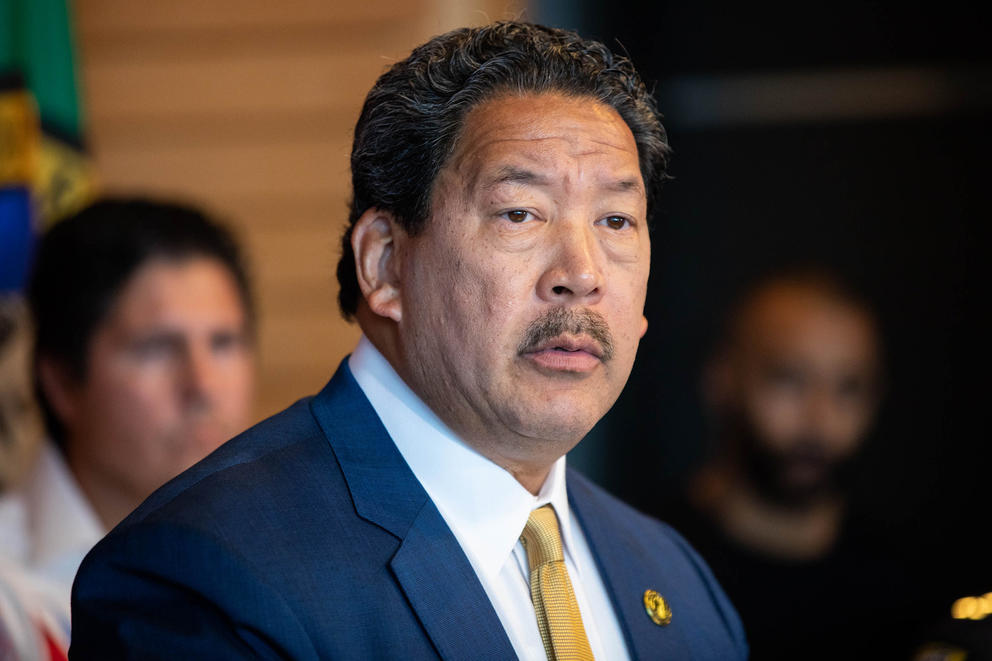“When you have a good hand and a plan that’s working, you double down,” said Harrell in a speech Tuesday. “And that’s what this budget proposal does – it doubles down on the priorities that matter for the city and it invests in a better tomorrow for Seattle.”
His proposal is an update to the 2023-2024 budget adopted by the City Council in November 2022, as Seattle operates on a two-year biennial budget. It offers minor adjustments more than wholesale changes and will now go before the Seattle City Council.
Harrell’s proposal includes spending an additional $334 million on affordable-housing construction and operations, a 32% increase over the 2023 budget and a new high-water mark for Seattle’s spending on subsidized, income-restricted housing.
That record spending proposal comes with a big caveat, however: $88 million of the proposed $334 million investment would come from the renewal of the Seattle Housing Levy, which is up for voter approval on the November ballot.
The proposed budget would also provide $850,000 to cover start-up costs for the Seattle Social Housing Developer, the voter-approved public development authority that seeks to build mixed-income affordable housing in the city.
To help address homelessness, Harrell’s budget directs $105.7 million to the King County Regional Homelessness Authority to support its work.
The proposed budget would provide $1.9 million to extend by another year the Third Avenue Project. It is an effort to do outreach with people using and selling drugs and engaging in other illegal activity in the Downtown core to help connect them with treatment, services and job opportunities that might help them exit the illicit economy.
In recent years, people in the human-services sector — which includes homeless outreach, affordable housing, drug treatment, elder care and much more — have sounded the alarm about an exodus of workers spurred on by low wages and increasingly difficult work. To address that, Harrell’s budget proposal increases funds for human-services wages and other nonprofit expenses by $10 million over last year’s endorsed 2024 budget. Of that, $2.6 million is mandated by a 2019 Seattle law requiring human-services contracts be pegged to inflation. Another $4.3 million would provide another 2% pay increase for human-services workers. The final $2.9 million would provide one-time retention bonuses for child care workers.
In a statement released Tuesday, City Councilmembers Lisa Herbold and Andrew Lewis called the 2% increase a step in the right direction, but noted it falls short of the 7% increase recommended by the authors of a University of Washington study on human-services worker wages. In June, the City Council passed a resolution calling for a 3.5% wage equity increase for human-services workers in 2024 and another 3.5% in 2025.
To help address the drug crisis, Harrell’s budget proposal includes $7 million in previously unspent federal funds and $2.2 million from the city’s settlement with opioid manufacturers and distributors to expand treatment services and launch an overdose recovery center.
The Community Assisted Response and Engagement department (CARE) would get $26.5 million in the 2024 budget update. CARE is the newly created third public safety department that will lead Seattle’s dual dispatch pilot project, launching in October, that will send social workers and mental health professionals to respond to some emergency calls alongside police officers when those emergencies are better handled by non-sworn officers. The CARE department also houses Seattle’s 911 dispatchers.
Harrell’s proposal would increase the Seattle Police Department’s budget by $8.3 million over the endorsed 2024 budget passed last fall — from $381.1 million to $389.4 million.
Within that, the budget proposal includes $1.8 million for police technology including automatic license-plate readers, CCTV cameras and acoustic gunshot detectors. The City Council voted to remove funding for the controversial gunshot detector systems in the 2023 budget.
In addition, the budget proposal will pay for 24 full-time firefighters split between West Seattle’s two fire departments. West Seattle got a temporary increase in firefighters while the West Seattle bridge was out of commission, and this budget would make those positions permanent.
Seattle is facing a stormy budget forecast thanks to a combination of declining revenue and the projected impact of inflation. Much of the declining revenue comes from layoffs in the tech sector and the subsequent loss of payroll taxes, as well as from the slow real estate market’s impact on real estate excise taxes (REET). According to City Budget Office Director Julie Dingley, the 55% forecasted decline in REET from 2021 to 2023 is the largest the city has experienced since the start of the Great Recession.
Last year, the 2024 General Fund budget was shored up with revenue from the Jumpstart Payroll Expense tax — money originally earmarked for housing, homelessness and climate resilience. The City Council authorized its use only for balancing the 2023-2024 budget. Beginning in 2025, the city general fund is projected to have a $251 million deficit that will grow to $498 million in 2026.
Harrell’s proposed 2024 budget will now head to the City Council for the lengthy process of considering additional proposals from Councilmembers and final budget balancing.



